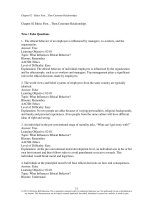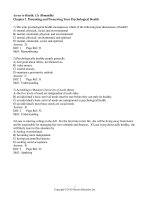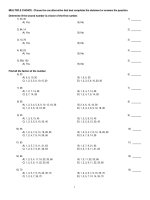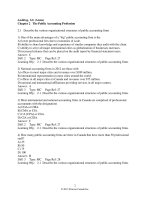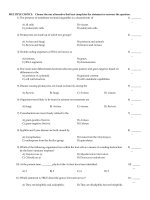Foundations of education 12th edition ornstein test bank
Bạn đang xem bản rút gọn của tài liệu. Xem và tải ngay bản đầy đủ của tài liệu tại đây (152.94 KB, 9 trang )
Chapter 2: The Teaching Profession
ESSAY
1. Many educators believe that increasing teachers' autonomy in deciding about spheres of work will
enhance the status of the teaching profession. A number of the issues and trends discussed in Chapter 2
have implications for teacher empowerment. Choose three of the topics covered in the chapter, and
discuss how and why each can help enhance teachers' status.
ANS:
Answers should focus on the extent to which the issues and trends are resulting in a greater voice for
teachers in matters of their profession. This could take the form of more influence on standards for
teacher preparation and certification, a greater role in mediated entry, or an enhanced decision-making
role in the operations of local schools and school districts. Regardless of the sphere of influence
discussed, answers should reflect an understanding that gaining a greater say in educational matters
provides teachers with a more professional role and helps education become more similar to
professions such as law and medicine.
2. Research suggests that the attrition rate for beginning teachers is one of the most significant
contributors to the shortage of teachers in the United States. Novice teachers who leave the profession
report that the “trauma” associated with the beginning year of teaching is the major factor in their
decision to leave. With this in mind, describe how the concept of “mediated entry” addresses the
concerns expressed by new teachers.
ANS:
Answers should focus on mediated entry as a systematic program of assistance for new teachers.
Several aspects of mediated entry are explored in the chapter: professional development schools serve
as an induction into the profession; some districts are matching probationary teachers with experienced
teachers who provide feedback and assistance; mentor teachers (who receive release time or stipends)
are assigned to work closely with new teachers; targeted expectations and training programs are
developed specifically for new teachers. The major teacher unions and education reform groups
support mediated entry.
3. Considering the ten points discussed in Chapter 2 regarding the characteristics of a professional,
evaluate where we are in today’s society at considering teachers professionals. Utilize at least three
characteristics in your support of the point.
ANS:
The response should include at least three of the following: sense of public service, defined body of
knowledge, specialized training, control over standards, decisions are made about sphere of work,
acceptance of responsibility of performance standards, self-governing organization, professional
organizations, code of ethics, and high prestige and economic standing.
MULTIPLE CHOICE
Copyright © Cengage Learning. All rights reserved.
Test Bank 2-2
1. The fact that there is no agreed-upon body of knowledge for teaching is a limitation when professional
organizations try to increase teachers'
a. accountability.
c. empowerment
b. autonomy.
d. professionalism.
ANS: D
2. When considering a defined body of knowledge as a characteristic of a profession, which of the
following statements accurately describes a criticism of teacher preparation programs?
a. Too many academic content courses are required.
b. Not enough pedagogy courses are required.
c. There is a healthy mix of content and pedagogy courses.
d. Too many education courses are required.
ANS: B
3. The phrase teaching out of license means teaching out of
a. the district in which one received tenure.
b. the grade level in which one student-taught.
c. the state in which one received one's original certification.
d. the subject in which one is certified.
ANS: D
4. Teaching is often thought of as a “semi profession” or “emerging profession,” much like
a. doctors and nurses.
c. nursing and social workers.
b. accountants and business owners.
d. lawyers and judges.
ANS: C
5. Preparing a good teacher in a “defined body of knowledge” often results in _______________ being a
part of the teacher preparation program.
a. professional education
c. general education courses
b. “major” and “minors” in the subject area d. all of the above
ANS: D
KEY: WWW
6. In recent measures of occupational prestige, teachers rank
a. at the top of the scale alongside physicians.
b. above the ninetieth percentile.
c. at the bottom of the scale.
d. at the fiftieth percentile.
ANS: B
7. Which of the following is not an impediment to teaching being considered a profession?
a. a lack of professional associations
b. a defined body of knowledge and skills beyond that grasped by laypersons
c. autonomy in deciding about spheres of work
d. control over licensing standards and entry requirements
Test Bank 2-3
ANS: A
8. Which of the following statements most accurately compares teaching to other professions, such as
medicine and law?
a. Teachers have more professional autonomy and make many of the major decisions
affecting their work.
b. Like lawyers and doctors, teachers must go through an extensive educational process to be
licensed.
c. Teachers are more affected by decisions of people outside the profession than are lawyers
and doctors.
d. Teachers are accorded economic and social prestige equal to that of lawyers and doctors.
ANS: C
KEY: WWW
9. Which of the following has most significantly increased the prestige of teaching in the eyes of the
public?
a. better staff development programs
b. increased level of education of teachers
c. teachers' involvement in curriculum development
d. alternative certification of teaching candidates
ANS: B
10. Compared to the salary of the average college graduate, teacher pay is
a. lower.
c. higher.
b. about the same.
ANS: A
KEY: WWW
11. Collective bargaining can influence which of the following issues?
a. salaries only
c. school-based management only
b. working conditions only
d. all of the above
ANS: D
12. As of 2009, _________________ of the twelve hundred colleges that train teachers were not
accredited by National Council for Accreditation of Teacher Education (NCATE).
a. 10 percent
c. 33 percent
b. 18 percent
d. 42 percent
ANS: D
KEY: WWW
13. Which of the following presents the greatest obstacle to teachers' gaining the kind of autonomy
suggested by the National Board for Professional Teaching Standards?
a. Teachers do not receive training in organizing and running their own professional
organizations.
b. Most teachers are not interested in gaining more autonomy in their work.
c. Because education is a public enterprise and a public responsibility, citizens and their
elected officials will be slow to turn control over to teachers.
Test Bank 2-4
d. The teaching population in the United States is too large and too varied to govern its own
professional affairs.
ANS: C
14. Which of the following is not evidence that teaching is increasingly being recognized as a full-fledged
profession in this country?
a. Teachers are investing more time in enhancing their own professional knowledge base
through university and college education, staff development, and workshops.
b. Teachers are gaining more opportunities to participate in decision making through efforts
such as school-based management.
c. Salaries and benefits for teachers have improved over the last several decades.
d. There is a great deal of variety in what is defined as a “knowledge base” for teaching.
ANS: D
15. Your friend Susan found her first year of teaching to be very traumatic. She had great difficulty
adjusting to the “real world” of school, and she felt overwhelmed by how much she had to learn and to
handle. Which of the following might have helped her most in avoiding such negative experiences
during her initial year of teaching?
a. more pedagogy (methods) courses in her teacher preparation program
b. a fifth-year preparation program
c. a mediated entry program
d. periodic, one-day, in-service training workshops
ANS: C
KEY: WWW
16. By 2009, ________________states had adopted or adapted NCATE unit standards for state evaluation
of teacher-education programs.
a. thirteen
c. twenty-five
b. three
d. thirty-six
ANS: C
17. Interest in staff development has increased because it is being seen as
a. a cost-efficient way to retain teachers.
b. a way to stay current with the latest educational trends.
c. a means of removing ineffective teachers from teaching.
d. a way to improve student scores on standardized achievement tests.
ANS: B
KEY: WWW
18. Merit pay is given to a teacher who has
a. caused student achievement scores to rise.
b. demonstrated superior performance.
c. participated in staff development activities.
d. taught in the district twenty years or more.
ANS: B
Test Bank 2-5
19. Critics of merit pay say that it will reduce
a. the educational experience for students.
b. competition and favoritism.
c. the salaries of average-ability teachers.
d. conformity in classroom teaching.
ANS: A
20. In terms of the development of an organizational and service model, individual parent-teacher
associations can best be described as:
a. uniform
c. affiliated
b. subordinate
d. sovereign
ANS: D
21. Urban teachers prefer to join the AFT primarily because of the organization's
a. research on urban conditions.
b. provision for membership by administrators.
c. publications directed toward urban teachers.
d. use of traditional union tactics.
ANS: D
22. The AFT does not allow membership of
a. transportation workers.
b. municipal workers.
c. cafeteria employees
d. school administrators.
ANS: D
23. Specialized professional organizations generally do not provide
a. conferences.
b. information on trends and policies.
c. political lobbies at the national and state levels.
d. publications.
ANS: C
24. A newly developing trend with teaching qualifications is for teachers to _________________.
a. specialize in just one area and always teach that area.
b. teach out-of-field in subject areas where they are not recognized as experts.
c. become experts and limit teaching time.
d. teach extended months of the year.
ANS: B
KEY: WWW
25. Which of the following organizations has historically most closely represented teacher interests
through traditional union activities such as collective bargaining and strikes?
a. American Federation of Teachers
b. National Board for Professional Teaching Standards
c. National Educational Association
d. Phi Delta Kappa
Test Bank 2-6
ANS: A
26. Which of the following statements about professional organizations for teachers (such as the NEA, the
AFT, and the National Board for Professional Teaching Standards) is most accurate?
a. The American Federation of Teachers (AFT) clearly dominates the decision-making
process in public education.
b. Public education has been able to achieve a balanced and effective working relationship
among all the educational interest groups.
c. It is difficult to argue that there is an educational interest group that wields the same
amount of influence as the American Medical Association (AMA) does for medicine or
the Bar does for law.
d. Teachers do not need an organization that represents their professional interests.
ANS: C
27. _____________________ has driven the need for highly qualified teachers to emerge from other
professions through alternative certification methods.
a. The No Child Left Behind Act
b. IDEA
c. The National Board for Professional Teaching Standards
d. NCATE
ANS: A
28. What has been a major contributor to the rise in the level of “occupational prestige” that teachers are
rated?
a. increased levels of education and complex nature
b. need for more “highly qualified teachers”
c. abstract skill and education
d. language acquisition
ANS: A
29. In 2006, the average teacher’s salary was ________________ below that of comparable workers.
a. 15 percent
c. 35 percent
b. 25 percent
d. 5 percent
ANS: A
30. The educational reform movement of the 1980’s and 1990’s contributed to __________________.
a. pressure on districts for increased salaries
b. reductions of benefits for teachers
c. alignment of professional standards
d. awareness of basic rights
ANS: A
31. Over thirty-four states legally require _____________, while it is permissible in eleven states.
a. professional registration
c. systematic mentoring
b. the ability to determine all benefits
d. collective bargaining
Test Bank 2-7
ANS: D
32. _______________ do not permit collective bargaining.
a. Charter schools
c. Public schools
b. Private schools
d. Colleges and universities
ANS: B
33. Professional standard boards in each state have the authority to _______________________.
a. issue certificates
c. renew certificates
b. revoke certificates
d. all of the above
ANS: D
KEY: WWW
34. The _________________ has prepared a certification process that is supported by both the AFT and
NEA for a national recognition.
a. National Board for Professional Teaching Standards
b. American Federation of Teachers
c. National Education Association
d. National Association of Educators
ANS: A
35. _____________ percent of teachers leave the profession in the first five years.
a. 15
c. 45
b. 25
d. 65
ANS: C
36. The need for mediated entry is supported by______________________________.
a. No Child Left Behind
c. education reform groups
b. the definition of “highly qualified”
d. all of the above
ANS: D
37. Often new teachers pursue their staff development in hopes of achieving _______________.
a. tenure
c. professional growth
b. a Master’s degree
d. continuous training
ANS: B
38. Merit pay is often considered a(n) __________________ for superior performance.
a. reward
c. union issue
b. negotiation
d. continuous training
ANS: A
Test Bank 2-8
39. Carlos has just attended an end-of-the year party with his fellow first-year teachers of the Orchard
Valley School District. According to statistics, approximately what percentage of the teachers present
will not return to the profession in the coming year?
a. 5
c. 20
b. 15
d. 40
ANS: B
40. The division and rivalry of the National Education Association and the American Federation of
Teachers is often seen as
a. a healthy choice.
c. detrimental to the teaching profession.
b. a separation by geographical location.
d. a joint effort.
ANS: C
SHORT ANSWER
1. Why does Chapter 2 support the need for a formal, systematic mediated entry for new teachers?
ANS:
There is currently a high rate of turnover for new teachers with many feeling isolated in their early
years. They often have periods of anxiety, frustration, fear and sometimes trauma. A formal
internship under a mentor would help with the transition into a new field.
2. Provide two examples of groups recruited to teaching by alternative certification, and describe why
this path to certification would probably reduce the professional status of teachers.
ANS:
Examples might include using college-educated retirees, people seeking second careers, or industrial
personnel. Any of these procedures would probably reduce the professional status of teachers, because
teachers would not be involved in selecting the criteria, procedures, or personnel. Moreover,
alternative certification undermines the traditional training that leads to certification.
3. The Parent-Teacher Association (PTA) has chosen to focus its attention nationally on a variety of
educational issues. What are some of these issues?
ANS:
The issues include reading, urban education, violence on television, combating censorship, quality of
children's programs, child nutrition, sex education, AIDS education, drug abuse prevention, and
improving school discipline.
4. Why would teachers be interested in joining specialized professional organizations?
ANS:
The primary reasons are access to professional publications in the selected area, regional and national
conferences, contact with other professionals, participation in the flow of new ideas about curriculum
and instruction, and exposure to current research.
Test Bank 2-9
5. What are the reasons for increased interest in staff development for teachers?
ANS:
Answers could comment on (a) new state requirements mandating that teachers renew their
professional skills to retain their teaching certificates; (b) the increasing knowledge base in areas such
as educational technology; and (c) increased commitment to instructional improvement.
6. What potential hardships might occur when each state sets its own certification requirements?
ANS:
There is significant variation from state to state on the educational requirements and the preparation of
certification. Many teachers cannot transfer their own certification outside of their original
certification.
7. When one considers that teachers do not decide about the “spheres of work”, who instead controls the
decision making? What are some of the deciding factors?
ANS:
Outside experts, government officials, business leaders and civic groups tend to make the decisions
about selection of books, grant proposals, and resolve school-community issues. Teachers too often
have no control of the decisions that affect their performance in the classroom.
8. Describe common topics of discussion that collective bargaining often covers outside of salary
negotiations.
ANS:
The answer can include any of the following additional points: peer review, career ladders,
performance pay, benefits, charter schools, standard setting, and school-based management.
